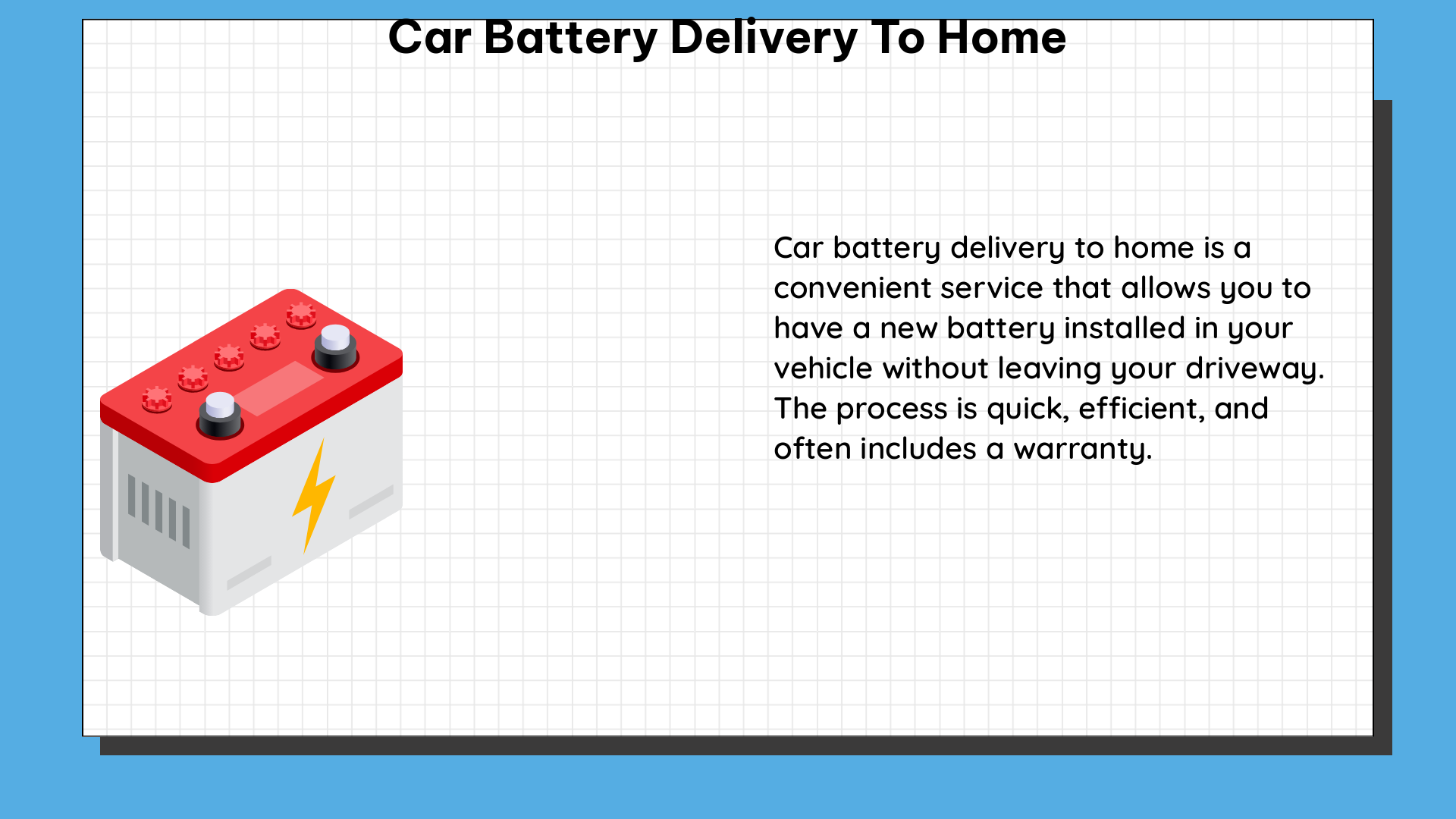Car battery delivery to home is a convenient service that allows customers to replace their car batteries without having to leave their homes. This service typically involves the delivery of a new battery to the customer’s location, as well as the removal and proper disposal of the old battery.
Understanding Car Battery Specifications
When it comes to car battery delivery to home, it’s essential to consider the technical specifications of the battery itself. The size and weight of the battery are crucial factors, as most car batteries weigh between 20 and 60 pounds, making them quite heavy to transport.
Battery Types and Requirements
There are several different types of car batteries available on the market, each with its own unique set of specifications and requirements:
- Lead-Acid Batteries: These are the most common type of car batteries, typically weighing between 30 and 50 pounds. They require proper handling and disposal due to the presence of lead and sulfuric acid.
- Nickel-Cadmium (NiCd) Batteries: These batteries are less common in modern vehicles, but they can still be found in some older models. They weigh between 25 and 45 pounds and contain hazardous materials like cadmium.
- Lithium-Ion (Li-ion) Batteries: Increasingly popular in hybrid and electric vehicles, Li-ion batteries are lighter, weighing between 20 and 40 pounds. However, they require specialized handling and transportation due to their flammable nature.
It’s crucial that the delivery service is familiar with the specific type of battery being delivered and can handle it accordingly.
The Delivery Process

The car battery delivery to home process typically involves the following steps:
- Scheduling the Delivery: The delivery service will work with the customer to schedule a convenient time and date for the battery delivery.
- Transportation: The delivery team will transport the new battery to the customer’s location, along with any necessary tools and equipment.
- Old Battery Removal and Disposal: Upon arrival, the delivery team will safely remove the old battery from the customer’s vehicle and dispose of it properly, in accordance with local regulations.
- New Battery Installation: The delivery team will then install the new battery and ensure that it is functioning correctly before leaving the customer’s premises.
Safety Considerations
Safety is of paramount importance when it comes to car battery delivery to home. Car batteries contain hazardous materials, such as lead and sulfuric acid, which require careful handling and disposal. The delivery service must be well-versed in the proper protocols for transporting, handling, and disposing of these batteries.
Hazardous Material Handling
According to the Pipeline and Hazardous Materials Safety Administration (PHMSA), car batteries are classified as Class 8 hazardous materials, which means they must be transported and handled with specific safety measures in place. [1] This includes the use of appropriate personal protective equipment (PPE), such as gloves and goggles, and the proper labeling and packaging of the batteries.
Disposal and Recycling
Once the old battery has been removed, it must be disposed of or recycled in accordance with local and federal regulations. Many delivery services will handle this process on behalf of the customer, ensuring that the battery is disposed of safely and responsibly.
Additional Considerations
When choosing a car battery delivery to home service, there are a few other factors to consider:
Warranty and Guarantee
It’s important to ensure that the delivery service provides a warranty or guarantee on the new battery, ensuring that the customer can get a replacement if there are any issues.
Delivery Costs
While some companies may offer free delivery, others may charge a fee for this service. It’s essential to compare the costs and services of different delivery providers to ensure that you are getting the best value for your money.
Conclusion
Car battery delivery to home is a convenient and efficient way to replace a car battery without having to leave your home. By understanding the technical specifications of car batteries, the delivery process, and the safety considerations involved, you can ensure that the process is safe, efficient, and cost-effective. When choosing a delivery service, be sure to consider factors like warranty, guarantee, and delivery costs to get the best value for your money.
References:
- Transporting Lithium Batteries | PHMSA. (2023). Retrieved from https://www.phmsa.dot.gov/lithiumbatteries
- EERE eXCHANGE: Funding Opportunity. (2023). Retrieved from https://eere-exchange.energy.gov
- Christensen, P. A., Anderson, P. A., Harper, P. A., Lambert, G. D. J., Mrozik, S. M., Rajaeifar, M. A., … & Heidrich, O. (2021). Risk management over the life cycle of lithium-ion batteries in electric vehicles. Renewable and Sustainable Energy Reviews, 136, 110722. doi:10.1016/j.rser.2021.110722

The lambdageeks.com Core SME Team is a group of experienced subject matter experts from diverse scientific and technical fields including Physics, Chemistry, Technology,Electronics & Electrical Engineering, Automotive, Mechanical Engineering. Our team collaborates to create high-quality, well-researched articles on a wide range of science and technology topics for the lambdageeks.com website.
All Our Senior SME are having more than 7 Years of experience in the respective fields . They are either Working Industry Professionals or assocaited With different Universities. Refer Our Authors Page to get to know About our Core SMEs.